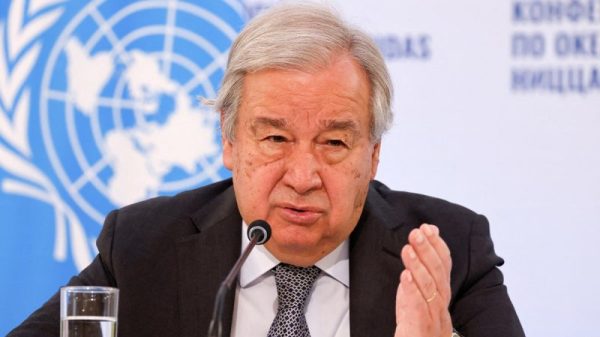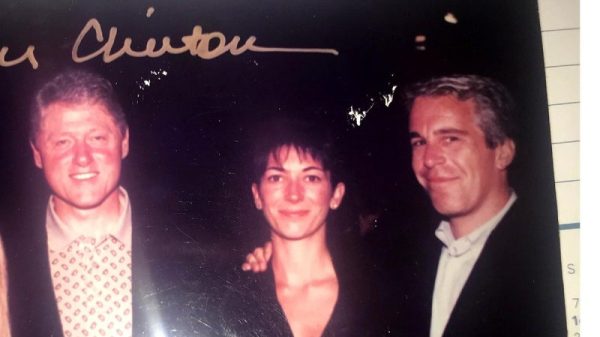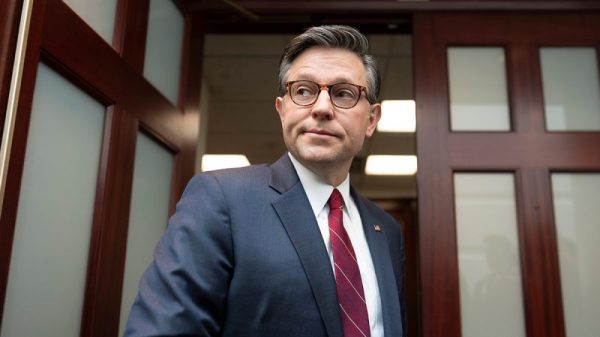Liz Cheney, one of the most vociferous critics of Donald Trump in the Republican Party, says she is weighing whether to mount her own third-party candidacy for the White House, as she vows to do “whatever it takes” to prevent the former president from returning to office.
While promoting her new book “Oath and Honor: A Memoir and a Warning,” the former Wyoming congresswoman — who was defeated by a Trump loyalist last year — is warning that Trump could transform America’s democracy into a dictatorship if he is reelected; anticipating, she said, that he would attempt to stay longer than his term.
“Several years ago, I would not have contemplated a third-party run,” Cheney said in a Monday interview with The Washington Post. But, she said, “I happen to think democracy is at risk at home, obviously, as a result of Donald Trump’s continued grip on the Republican Party, and I think democracy is at risk internationally as well.”
Given her appeal to independents, former Republicans and some Democrats, many Trump critics in both parties have noted that a presidential run by Cheney could undercut her stated goal of defeating Trump, because it could draw some votes away from President Biden. Cheney said those considerations would all be part of her analysis, and underscored that she would not do anything that would help Trump return to the White House.
Cheney, whose father is former vice president Dick Cheney, said she will make a final decision in the next few months. “We face threats that could be existential to the United States and we need a candidate who is going to be able to deal with and address and confront all of those challenges,” Cheney said. “That will all be part of my calculation as we go into the early months of 2024.”
The former congresswoman would face a daunting task if she decides to run — and not just because of the deep antipathy toward her that Trump fostered among many Republicans as he urged them to cast her from office. To run for president outside the two-party system in America, candidates must either attach themselves to third parties that have ballot access or petition for their own place on state ballots, which can be a costly and cumbersome process. In order for a candidate to participate in the debates organized by The Commission on Presidential Debates next fall, they must have at least 15 percent support in national polls and are required to meet other criteria.
If she does not run for the White House, Cheney is not ruling out voting for Biden or campaigning for him if he is the 2024 Democratic nominee. In a remarkable turn of events for a former member of House GOP leadership, Cheney also said she would use her influence in 2024 to ensure voters do not elect a pro-Trump Republican majority in the House and that she will back “pro-Constitution candidates” and “serious people,” regardless of party.
She argues that the Trump “enablers” who control the House — among whom she includes House Speaker Mike Johnson (R-La.) — pose a serious threat because they would likely accede to Trump’s demands. That includes the possibility that Trump loyalists in the House would try to interfere with the election results in January 2025 if given the opportunity.
Cheney writes in her book that voters from throughout the political spectrum should unite behind the cause not only of stopping Trump from regaining the White House, but also curbing the power of those “enablers” who she says have “preyed on the patriotism of millions of Americans.”
“This is more important than partisan politics,” she writes in the epilogue. “Every one of us — Republican, Democrat, Independent — must work and vote together to ensure that Donald Trump and those who have appeased, enabled, and collaborated with him are defeated. This is the cause of our time.”
At a moment when Trump is leading his GOP rivals by more than 40 points in many polls of the Republican race, she contends that not just the Republican primary electorate but the party itself has “lost its way,” caught in the grip of what she calls the “cult of personality.”
Because of that, the “tectonic plates of our politics are shifting,” she said, and conventional wisdom about third parties and the bifurcated primary process that produces a Republican nominee and a Democratic nominee is “pretty irrelevant, in my view, in the 2024 cycle, because the threat is so unique.”
“There are a majority of the voters in this country who are too responsible to entrust Donald Trump with the authority of the White House and the authority of the presidency,” Cheney said. “So I think a large part of the task going into ‘24 is talking to those people and just making sure they have the facts in front of them.”
When asked how she would define her potential platform if she were to run for president, Cheney said she believes that the country must elect a commander in chief who will abide by the Constitution, respect the rule of law and maintain America’s commitment to defending freedom abroad. She cited Trump’s threats to pull out of the NATO alliance and the refusal of many House Republicans to commit more U.S. aid to Ukraine as examples of grave threats to America’s security interests.
Cheney, who is now professor of practice with the University of Virginia Center for Politics, receded from the spotlight for much of this year after her prominent role in a congressional panel that investigated and held high-profile public hearings on the Jan. 6, 2021 attack on the U.S. Capitol by a pro-Trump mob. In her book, she offers a behind-the-scenes look at her role in those hearings and the unlikely alliance that she forged with former House Speaker Nancy Pelosi, who asked her to serve on the select committee investigating the January 6th attack. `
“Every time I went to her with a concern, a proposed approach, or a request that she intervene with Democrats to help guide things in the right direction, she backed me up,” Cheney writes.
The former congresswoman, who had won her prior races in Wyoming with huge majorities, also reflects on her 2022 defeat by a margin of more than 30 percentage points by now-Rep. Harriet M. Hageman (R-Wyo.), whom Trump backed as he tried to purge critics such as Cheney from the party’s elected ranks.
Though Cheney had voted with Trump more than 90 percent of the time, she writes that she knew after voting to impeach Trump over his conduct on January 6th — and becoming one of his chief targets — that the “easiest course” would have been to not seek reelection. She explains that she ultimately decided that doing so would weaken her hand in confronting the threat that Trump posed.
“Withdrawing from the race for my seat in Congress would be seen as declaring defeat in my own election,” she writes in her memoir, released Tuesday. “It might also signal that our investigation had failed — that I was giving up, or that this fight somehow no longer merited the effort.”
Her foray onto the campaign trail in 2024, no matter how she decides to involve herself, will be a fresh test of her political capital. In 2022, she focused on defeating election deniers such as Arizona GOP gubernatorial candidate Kari Lake and secretary of state nominee Mark Finchem in Arizona. (Both lost). This cycle, Cheney has held off from endorsing any candidates running as alternatives to Trump in the GOP primary. Given the antipathy toward her among Republicans, it is unclear whether her support would be helpful.
Cheney’s book delves into her close role with her father, who acted as her adviser and her protector during some of the most turbulent moments of Trump’s presidency and the aftermath — calling to warn her on January 6, 2021 that she was in danger after Trump told his supporters during a rally on the Ellipse that “We got to get rid of the weak congresspeople, the ones that aren’t any good, the Liz Cheneys of the world.”
Asked whether she would attempt to enlist her dad and his onetime running mate, former president George W. Bush, in her crusade to prevent Trump from becoming president, Cheney said the country will be facing a moment “where everyone must speak out.”
“We need everybody on the field,” she said, adding that includes the many Republicans who worked for Trump at the highest levels who have called out his conduct. “That needs to be amplified and organized in a concerted effort, to make sure people understand that these are the people closest to him — and this is what they say about his lack of fitness for office. It is going to require all hands on deck certainly in this campaign cycle.”
Offering a gripping account of the terror inside the House chamber in the midst of the violence and chaos at the Capitol on Jan. 6, Cheney’s book is unsparing in her criticism of fellow Republicans who carried out Trump’s bidding as he tried to overturn the 2020 election results and members who she said placed their own political ambitions over their oath to the Constitution.
Cheney called the effort of Sen. Ted Cruz (R-Tex.) — who with other senators had proposed a 10-day multistate audit of the election results in January 2021 — “one of the worst cases of abandonment of duty for personal ambition I’d ever seen in Washington.”
She excoriates the shape-shifting postures adopted by then-House Minority Leader Kevin McCarthy (R-Calif.) as he bent to Trump’s will — arguing that “every time Kevin McCarthy had faced a decision of consequence, he had done the wrong thing.” Cheney notes that when she first saw the photo of McCarthy meeting with Trump at Mar-a-Lago on Jan. 28, 2021 — weeks after McCarthy had told members he believed Trump was responsible for the violence at the Capitol — she thought the photograph was a fake, believing “not even Kevin McCarthy could be this craven.”
Cheney also writes at length about the attempts by Johnson, who was then a lesser-known congressman, to help Trump’s efforts to overturn the 2020 election results. Recounting his questionable analysis as he presented himself as a “constitutional lawyer” in meetings with Republican members, Cheney charges that he was “especially susceptible to flattery from Trump” and “aspired to being anywhere in Trump’s orbit.”
Liz Cheney, one of the most vociferous critics of Donald Trump in the Republican Party, says she is weighing whether to mount her own third-party candidacy for the White House, as she vows to do “whatever it takes” to prevent the former president from returning to office.
While promoting her new book “Oath and Honor: A Memoir and a Warning,” the former Wyoming congresswoman — who was defeated by a Trump loyalist last year — is warning that Trump could transform America’s democracy into a dictatorship if he is reelected; anticipating, she said, that he would attempt to stay longer than his term.
“Several years ago, I would not have contemplated a third-party run,” Cheney said in a Monday interview with The Washington Post. But, she said, “I happen to think democracy is at risk at home, obviously, as a result of Donald Trump’s continued grip on the Republican Party, and I think democracy is at risk internationally as well.”
Given her appeal to independents, former Republicans and some Democrats, many Trump critics in both parties have noted that a presidential run by Cheney could undercut her stated goal of defeating Trump, because it could draw some votes away from President Biden. Cheney said those considerations would all be part of her analysis, and underscored that she would not do anything that would help Trump return to the White House.
Cheney, whose father is former vice president Dick Cheney, said she will make a final decision in the next few months. “We face threats that could be existential to the United States and we need a candidate who is going to be able to deal with and address and confront all of those challenges,” Cheney said. “That will all be part of my calculation as we go into the early months of 2024.”
The former congresswoman would face a daunting task if she decides to run — and not just because of the deep antipathy toward her that Trump fostered among many Republicans as he urged them to cast her from office. To run for president outside the two-party system in America, candidates must either attach themselves to third parties that have ballot access or petition for their own place on state ballots, which can be a costly and cumbersome process. In order for a candidate to participate in the debates organized by The Commission on Presidential Debates next fall, they must have at least 15 percent support in national polls and are required to meet other criteria.
If she does not run for the White House, Cheney is not ruling out voting for Biden or campaigning for him if he is the 2024 Democratic nominee. In a remarkable turn of events for a former member of House GOP leadership, Cheney also said she would use her influence in 2024 to ensure voters do not elect a pro-Trump Republican majority in the House and that she will back “pro-Constitution candidates” and “serious people,” regardless of party.
She argues that the Trump “enablers” who control the House — among whom she includes House Speaker Mike Johnson (R-La.) — pose a serious threat because they would likely accede to Trump’s demands. That includes the possibility that Trump loyalists in the House would try to interfere with the election results in January 2025 if given the opportunity.
Cheney writes in her book that voters from throughout the political spectrum should unite behind the cause not only of stopping Trump from regaining the White House, but also curbing the power of those “enablers” who she says have “preyed on the patriotism of millions of Americans.”
“This is more important than partisan politics,” she writes in the epilogue. “Every one of us — Republican, Democrat, Independent — must work and vote together to ensure that Donald Trump and those who have appeased, enabled, and collaborated with him are defeated. This is the cause of our time.”
At a moment when Trump is leading his GOP rivals by more than 40 points in many polls of the Republican race, she contends that not just the Republican primary electorate but the party itself has “lost its way,” caught in the grip of what she calls the “cult of personality.”
Because of that, the “tectonic plates of our politics are shifting,” she said, and conventional wisdom about third parties and the bifurcated primary process that produces a Republican nominee and a Democratic nominee is “pretty irrelevant, in my view, in the 2024 cycle, because the threat is so unique.”
“There are a majority of the voters in this country who are too responsible to entrust Donald Trump with the authority of the White House and the authority of the presidency,” Cheney said. “So I think a large part of the task going into ‘24 is talking to those people and just making sure they have the facts in front of them.”
When asked how she would define her potential platform if she were to run for president, Cheney said she believes that the country must elect a commander in chief who will abide by the Constitution, respect the rule of law and maintain America’s commitment to defending freedom abroad. She cited Trump’s threats to pull out of the NATO alliance and the refusal of many House Republicans to commit more U.S. aid to Ukraine as examples of grave threats to America’s security interests.
Cheney, who is now professor of practice with the University of Virginia Center for Politics, receded from the spotlight for much of this year after her prominent role in a congressional panel that investigated and held high-profile public hearings on the Jan. 6, 2021 attack on the U.S. Capitol by a pro-Trump mob. In her book, she offers a behind-the-scenes look at her role in those hearings and the unlikely alliance that she forged with former House Speaker Nancy Pelosi, who asked her to serve on the select committee investigating the January 6th attack. `
“Every time I went to her with a concern, a proposed approach, or a request that she intervene with Democrats to help guide things in the right direction, she backed me up,” Cheney writes.
The former congresswoman, who had won her prior races in Wyoming with huge majorities, also reflects on her 2022 defeat by a margin of more than 30 percentage points by now-Rep. Harriet M. Hageman (R-Wyo.), whom Trump backed as he tried to purge critics such as Cheney from the party’s elected ranks.
Though Cheney had voted with Trump more than 90 percent of the time, she writes that she knew after voting to impeach Trump over his conduct on January 6th — and becoming one of his chief targets — that the “easiest course” would have been to not seek reelection. She explains that she ultimately decided that doing so would weaken her hand in confronting the threat that Trump posed.
“Withdrawing from the race for my seat in Congress would be seen as declaring defeat in my own election,” she writes in her memoir, released Tuesday. “It might also signal that our investigation had failed — that I was giving up, or that this fight somehow no longer merited the effort.”
Her foray onto the campaign trail in 2024, no matter how she decides to involve herself, will be a fresh test of her political capital. In 2022, she focused on defeating election deniers such as Arizona GOP gubernatorial candidate Kari Lake and secretary of state nominee Mark Finchem in Arizona. (Both lost). This cycle, Cheney has held off from endorsing any candidates running as alternatives to Trump in the GOP primary. Given the antipathy toward her among Republicans, it is unclear whether her support would be helpful.
Cheney’s book delves into her close role with her father, who acted as her adviser and her protector during some of the most turbulent moments of Trump’s presidency and the aftermath — calling to warn her on January 6, 2021 that she was in danger after Trump told his supporters during a rally on the Ellipse that “We got to get rid of the weak congresspeople, the ones that aren’t any good, the Liz Cheneys of the world.”
Asked whether she would attempt to enlist her dad and his onetime running mate, former president George W. Bush, in her crusade to prevent Trump from becoming president, Cheney said the country will be facing a moment “where everyone must speak out.”
“We need everybody on the field,” she said, adding that includes the many Republicans who worked for Trump at the highest levels who have called out his conduct. “That needs to be amplified and organized in a concerted effort, to make sure people understand that these are the people closest to him — and this is what they say about his lack of fitness for office. It is going to require all hands on deck certainly in this campaign cycle.”
Offering a gripping account of the terror inside the House chamber in the midst of the violence and chaos at the Capitol on Jan. 6, Cheney’s book is unsparing in her criticism of fellow Republicans who carried out Trump’s bidding as he tried to overturn the 2020 election results and members who she said placed their own political ambitions over their oath to the Constitution.
Cheney called the effort of Sen. Ted Cruz (R-Tex.) — who with other senators had proposed a 10-day multistate audit of the election results in January 2021 — “one of the worst cases of abandonment of duty for personal ambition I’d ever seen in Washington.”
She excoriates the shape-shifting postures adopted by then-House Minority Leader Kevin McCarthy (R-Calif.) as he bent to Trump’s will — arguing that “every time Kevin McCarthy had faced a decision of consequence, he had done the wrong thing.” Cheney notes that when she first saw the photo of McCarthy meeting with Trump at Mar-a-Lago on Jan. 28, 2021 — weeks after McCarthy had told members he believed Trump was responsible for the violence at the Capitol — she thought the photograph was a fake, believing “not even Kevin McCarthy could be this craven.”
Cheney also writes at length about the attempts by Johnson, who was then a lesser-known congressman, to help Trump’s efforts to overturn the 2020 election results. Recounting his questionable analysis as he presented himself as a “constitutional lawyer” in meetings with Republican members, Cheney charges that he was “especially susceptible to flattery from Trump” and “aspired to being anywhere in Trump’s orbit.”





















